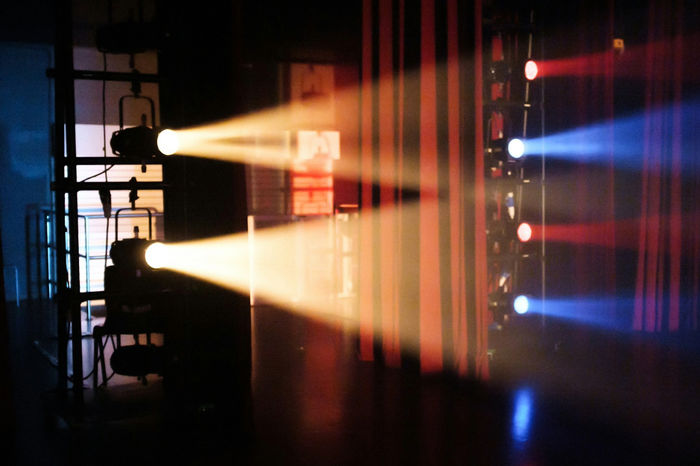Where are all the one-person shows?
Josh Pritchard argues that the Cambridge theatre scene is missing out on the creative brilliance possible through one-person shows

I have been reflecting on my first Michaelmas Term. It’s been a lovely eight weeks, and, honestly, the only disappointment that haunts my brain are those things I didn’t get to do - formals, society socials, speaker events, etc. But, as a theatre lover, I can’t help but think about some of the plays I missed as well. Outside of the three plays that this publication awarded five stars last term, there was one other play which I still lament having not seen.
Franz Kroetz’s Request Programme was shown at the Fitzpatrick Hall in mid-November. Its premise, as displayed on CamDram, reads: “One Actor. One Hour. No Words.” The play depicts a woman living in her apartment, quietly carrying out mundane tasks in a melancholic manner, before suffering an unfortunate fate. Amongst my friendship group, the play became fodder for debate and analysis, and amongst the wider CamDram community, it received commendable reviews, particularly for its star, Olivia Kiely. The sense of occasion which surrounded this show was rooted in its distinctiveness in a term where few other one-person plays were performed - the majority of the others, such as Margaret Saunderson Might Be God, What Is Going On and Lonely Stupid Violent, being Footlights Showcases. This poses the question: why aren’t there more solo plays being attempted in Cambridge?
“This poses the question: why aren’t there more solo plays being attempted in Cambridge?”
The largest obstacle is audience appeal. Anyone who’s seen La La Land knows that solo plays don’t always attract a large crowd, especially not the casual theatregoer. So, it doesn’t seem surprising why there is some aversion towards attempting them. However, in a student theatre scene as vibrant as Cambridge’s, where every production garners (some level of) attention, surely this is the perfect environment for creatives to attempt bold and distinctive art - pieces that might be impossible to realise upon leaving university. I don’t mean to sound demanding, nor dismissive of the brilliant plays which have been previously performed, but I do find it intriguing that more one-person plays are not attempted, considering both their lower logistical demands, and the opportunities they create.
Consider this: the average ADC production involves a cast of around half a dozen, supported by a larger team of producers, technicians, and designers - each bringing their own set of challenges over several weeks before culminating in a glorious big-budgeted spectacle. Does a one-person play take as much time? Or require as large a venue? There is, of course, the ultimate factor in the solo play: the performer. A one-person play is a Herculean feat, requiring immense stamina and dedication. It’s not for everyone, let alone a university student. But given the amount of theatre that some individuals manage to get themselves involved in, it’s difficult to argue that time would be a genuine obstacle. It is also worth considering that such a form of theatre poses a unique challenge for any actor, potentially fostering artistic growth much faster than any minor role in an overcrowded cast ever could.
“A one-person play is a Herculean feat, requiring immense stamina and dedication”
If you really want to get pedantic, you could argue that there is something limiting about there only being one speaker on stage. Michael Billington, in a piece for the Guardian, argued that a one-person piece could “never achieve the built-in ambivalence of the dialogue-based play”. I’m not sure I entirely agree, or even that “ambivalence” itself is something that can or should be neatly quantified.
Consider Michaela Coel’s Chewing Gum Dreams, written from the perspective of a 14-year-old girl growing up in London. Here, comedy arises not just from the play’s narrative, but from the speaker’s efforts to mimic the world around her. We, as the audience, can still simultaneously infer nuance and subtext from the speaker’s delivery. All that is required is a little more attention than we might normally pay.
Rakugo, a form of theatre from Japan, similarly rewards this, featuring a singular storyteller who brings events and characters to life with subtle shifts in tone, expression, and gestures, all while kneeling centre stage, armed only with a paper fan and a small cloth. Exploring different forms of theatre, such as this, not only attracts a wide range of individuals to CamDram but also cultivates a vibrant and diverse theatre scene. What more would the most ardent theatre fan want?
My New Year’s wish for CamDram is, I suppose, more inventiveness. For creatives to continue being daring, to continue pushing boundaries, and to continue creating work that astounds and moves us in equal measure, whether it’s through a one-person show or any number of other imaginative forms. I am looking forward to what’s in store next term.
 Features / Should I stay or should I go? Cambridge students and alumni reflect on how their memories stay with them15 December 2025
Features / Should I stay or should I go? Cambridge students and alumni reflect on how their memories stay with them15 December 2025 News / Cambridge study finds students learn better with notes than AI13 December 2025
News / Cambridge study finds students learn better with notes than AI13 December 2025 News / Uni Scout and Guide Club affirms trans inclusion 12 December 2025
News / Uni Scout and Guide Club affirms trans inclusion 12 December 2025 Comment / The magic of an eight-week term15 December 2025
Comment / The magic of an eight-week term15 December 2025 News / News In Brief: Michaelmas marriages, monogamous mammals, and messaging manipulation15 December 2025
News / News In Brief: Michaelmas marriages, monogamous mammals, and messaging manipulation15 December 2025








